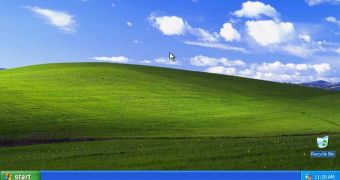Windows XP is no longer receiving updates and security patches, but that doesn't necessarily mean that everyone is ready to give up on it and move to a different platform.
Approximately 25 percent of the desktop users worldwide are still running it as we speak, so security vendors are one by one stepping in front of the media to issue warnings in order convince those who are yet to upgrade to speed up their efforts in the coming months.
Trend Micro today described Windows XP as a “relic of bygone age,” clearly pointing out that an operating system that was launched 13 years ago no longer has what it takes to protect you and your data.
“Windows XP simply wasn’t designed to cope with the kinds of modern threats facing it today. It was launched in 2001, long before the time of mobile and cloud computing. Back then, remote access was usually achieved via phone lines and networking was achieved with wired connections,” Trend Micro explained.
“Hackers were primarily bedroom-based mischief makers rather than the organized crime gangs and state-sponsored operatives we see today. It was a time before Trojans, ransomware or highly sophisticated targeted attacks.”
The security company also added that some cybercriminals were specifically waiting for the Windows XP end of support in order to disclose new vulnerabilities that had actually been discovered before that.
This way, hackers were trying to make sure that Microsoft isn't fixing the flaws in time for end of support, thus gaining the opportunity to exploit millions of computers that are yet to be upgraded to a different operating system without any support from the Redmond-based software giant.
“It also appears as if some cyber criminals had been sitting on exploits until the support deadline passed. In May, for example, Microsoft was forced to issue an emergency patch – which it also offered to XP users – after discovering active attacks using a zero-day vulnerability in all versions of Internet Explorer,” Trend Micro added.
Of course, Internet Explorer is also one of the apps that are representing a big risk for Windows XP users, especially because flaws in this browser have already been found and the company no longer wants to patch them.
“In fact, users stuck on XP can’t use any version of Explorer after IE8, opening them up to additional risk. Cyber criminals looking for a weakened operating system with unpatched vulnerabilities via which to launch a targeted attack campaign couldn’t dream of a better scenario than a PC running Windows XP,” the security vendor continued.
Microsoft has pretty much the same opinion and says that everyone still on Windows XP needs to upgrade to a newer operating system as soon as possible, explaining that the more time you postpone a decision, the more likely you are to get hacked.
Redmond's preferred to choice is obviously Windows 8.1, but the majority of those still on XP are going for Windows 7 in search for a more friendly working environment that also includes a Start menu.
Microsoft's decision to remove the Start menu in modern Windows is clearly affecting the transition off Windows XP, so it's no surprise that so many people choose Windows 7 as their next destination.

 14 DAY TRIAL //
14 DAY TRIAL //